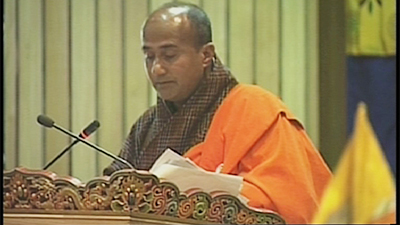 The Mines and Minerals Management Act of Bhutan (MMMA) 1995 will be tabled for amendment during the summer session of the parliament.
The Mines and Minerals Management Act of Bhutan (MMMA) 1995 will be tabled for amendment during the summer session of the parliament.
The Economic Affairs Minister, Loknath Sharma, shared this during the Question Hour session of the National Council on Wednesday.
The Eminent Member of the Council, Dasho Tashi Wangyal, said the act was adopted almost 24 years ago and as such not in line with the Constitution.
Also, underlining Article 1.12 and Article 9.7, the eminent member asked the minister about the possibility of amending the act in summer session.
“Will this government table the MMMA 1995 in the next session of the parliament as review of the act including studies and consultations are already done.”
The Article 1.12 states the rights over mineral resources, rivers, lakes and forests shall vest in the state and are the properties of the state which shall be regulated by the law.
The Article 9.7 says the state shall endeavour to develop and execute policies to minimise inequalities of income, concentration of wealth, and promote equitable distribution of public facilities among individuals and people living in different parts of the Kingdom.
 The economic affairs minister responded that the government will indeed table the MMMA 1995 for amendment in the summer sitting.
The economic affairs minister responded that the government will indeed table the MMMA 1995 for amendment in the summer sitting.
“The present government is genuinely concerned that benefits from mines are reaped by a few influential people. The common people got nothing. So we have to revise the act to bring uniform income generation among the people and create gainful employment opportunities.”
The minister added the revision of the act would curb wealth and income disparity among the people in the country and create employment opportunities.
The minister also said the government would stop issuing new mining licences or renewing the existing ones until the act is amended.
The national council proposed for MMMA 1995 amendments since the last ten years.
The independent studies conducted by the Anti-Corruption Commission and the Royal Audit Authority showed a large-scale corruption and loss of revenue from the mining sector.
Minerals form the basis of industrialisation and economic diversification. Recognising this, the government identified mining as one of the five jewels of the economy alongside hydropower, tourism, cottage and small industries and agriculture.





